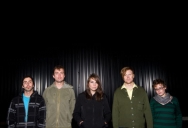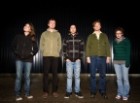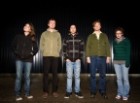They sound a bit like Jawbox. Or is it Arcade Fire? Wait, isn’t that a subtle Bowie influence? Pink Floyd? Talking Heads?
In fact, when it comes to Sylvie, Regina’s post-punk indie-rockers, there seem to be as many comparisons as there are listeners. Perhaps that’s because Sylvie sounds like, well, Sylvie. Whether it’s Joel Passmore’s idiosyncratic vocal phrasing; Riva Farrell Racette’s unique bass figures; crunchy fills from guitarist Chris Nottenboom; Erin Passmore’s soaring support vocals; or the complex, often syncopated drum licks of Jeff Romanyk, every time you think you know where a groove is going, Sylvie yanks you off in a different direction.
“From an arrangement standpoint, I think we’re just writing pop songs or rock songs,” Joel explains. “It’s just the ingredients within those. We all come from a very different place, so when you hear a really basic chord progression, someone like Chris will take the truck and just drive it off the road. It’s the same step for everybody.”
 Whatever the process, and whomever people think Sylvie does or doesn’t sound like, one thing reviewers seem to agree on is that Trees And Shade Are Our Only Fences, Sylvie’s newly-released third album, is a winner. Trees and Shade are Our Only Fences exceeds expectations, succinctly balancing songs that are musically complex and persuasively melodic. Noticeably more focused, Sylvie’s gorgeous arrangements have a more finely tuned sense of precision,” states Jonny Taint of PunkRockReview.org
Whatever the process, and whomever people think Sylvie does or doesn’t sound like, one thing reviewers seem to agree on is that Trees And Shade Are Our Only Fences, Sylvie’s newly-released third album, is a winner. Trees and Shade are Our Only Fences exceeds expectations, succinctly balancing songs that are musically complex and persuasively melodic. Noticeably more focused, Sylvie’s gorgeous arrangements have a more finely tuned sense of precision,” states Jonny Taint of PunkRockReview.org
Sylvie kicked off their “Fences” tour with a show at The Distrikt in Regina on October 11. The next day, they crammed their instruments and their five bodies into a van and headed for Winnipeg. By the time they get back at the end of November, they will have completed 27 shows in nine provinces and ten states. Joel admits it’s not always the most comfortable of situations, but they’ve done it before and they’ll do it again, if necessary.
“If you can sleep for five or six hours in a shitty van and still be excited to play the next show, there’s no reason to stop,” Joel says. “Unless you judge success by lavish hotels or tour buses and stuff like that, we’re still very fortunate we get to go on tour, play shows every night and people come out and appreciate our music. It’s still worth whatever it takes to get there.”
“I don’t know if I want to be 50 and sleeping in Chris’ van,” he adds jokingly. “Or maybe I do. Depends on what the alternative is.”
Anyone who has ever been stuck in a van with their band, even on a short tour, can appreciate that story. Jeff insists, all things considered, it works for Sylvie.
“It’s a full family dynamic. When we go on tour, it’s five of us and that’s the family. We all have to live equally with each other,” Jeff explains.
In Sylvie’s case, the “family dynamic” isn’t just figurative. Three members of the band are actually related. (Erin and Joel are siblings, and Riva and Joel are married to each other.) One might be inclined to predict a little bit of pressure in that situation, but Joel says it’s an advantage.
“It’s nice because I’ve been in bands before where we had to be apart and that’s hard,” he says. “It’s hard to leave family behind when you go away, so I feel very lucky in that respect. Believe it or not, Riva and I don’t bicker any more on tour compared to Jeff and I or Chris and I or Jeff and Chris or Chris and Riva.”
And they’ve come up with some strategies to help balance band life with home life. For example, when they’re not writing, recording or touring, it is not uncommon for Sylvie to take a few months hiatus from playing together.
“I think that’s a really healthy thing we’ve developed and we’re all still excited by it, so we’re still progressing,” Joel says.
It’s also important, they say, to find something fulfilling to do during the off times.
“I had the worst job ever once, (which I kept simply) because they let me come and go as I please,” Joel says. “But when the music thing isn’t working out so well - or doesn’t feel like it’s working out all that well - it’s good to have a job you enjoy.”
After nine years of day jobs and questionable accommodations, it’s apparent Sylvie isn’t on the overnight roller coaster to fame and fortune. Nevertheless, the band remains patient and upbeat, ever grateful for what they do have.
“I wasn’t expecting to record this record with [producer and American punk legend] J. Robbins,” Jeff says. “I think we’re ahead of where we projected we’d be right now. No matter how gradual the progression has seemed, it still feels like it’s leading to something. It doesn’t feel like there isn’t more to look forward to.”
And they’ve got plenty of good things to look back on, as well. In 1999, they were just four friends looking for a purpose. The moniker Sylvie was inspired by a short story of the same name from feminist author Barbara Gowdy’s 1996 collection, “We So Seldom Look on Love”.
“It’s an interesting story about finding yourself, which was what the band was doing at the time,” Jeff explains.
Fast forward to 2003 when Sylvie released their first CD, I Wish I Was Driving. It garnered them a nomination for Outstanding Independent Album-of-the-Year at the Western Canadian Music Awards. It also got them a deal with Winnipeg-based indie label Smallman Records, and led to the release of their sophomore offering, An Electric Trace (2005), a straight-ahead, hard-driving rock album.
With critical buzz surrounding An Electric Trace, Sylvie was ready to take the next step with showcases at CMJ, NXNE, CMW and SXSW. In 2006, the band garnered accolades in the form of CBC Galaxie’s Rising Star Award and a nod from The Toronto Star as “The star attraction” of Canada Music Week.
With the release of Trees And Shade, Sylvie is taking yet another step forward, as first-time headliners on the Canadian portion of their current tour - and on the American leg of the tour, they are supporting Minus the Bear.
“There is a progression.” Jeff says. “For one, people are giving us shows even without [a] headlining act to rely on for turnout...that’s encouraging.”
Headlining does have its challenges. “There is some pressure, but the strongest thing that we do as a group is play live,” Joel says. “That’s where everything started, and we can count on each other one hundred per cent. If anything, we’re happy that we can play a few more songs every night. The turnouts might not be as good, but that’s just the step we have to take.”
When they’re not billed as the headliner, that’s okay with them too. “We’re still at the stage where if a show’s going to do better in somebody’s hometown and they want to headline, there’s no ego or any of that. We just take shows we can get, (and) if they all line up in a way we can play them.”
While the band’s career has progressed, so has the music. Trees And Shade is less aggressive musically, vocally and lyrically than their previous efforts.
“I think it was just where we were headed,” Joel explains. “There were songs on the last record where I was trying to lay back a little bit more, but just the process that [producer] Brandon [Friesen] took, doubling and tripling and just adding and adding, definitely had an effect on it; whereas with J. it was more just ‘let’s try to get things that need to be done in one take, done in one good take.’”
In the interim between albums, they added Erin Passmore - Joel’s younger sister - on keyboards and support vocals. It gives the tunes a little more airy feel, but that’s not to say they’ve abandoned their trademark gloom and doom. The lyrics still tackle social, technological and environmental concerns in songs with titles such as "Please Make it Home", "Instruments of War", "Listen Up" and "Dark Ages".
“It’s still fairly apocalyptic,” Jeff says.
“I do really worry [about the world],” Joel says. “Maybe that’s part of how I deal with it - I write a song.”
Apocalyptic ruminations aside, Sylvie does have a sentimental side. The album title itself evokes imagery of contentment and openness, with a real Saskatchewan sensibility. Trees And Shade Are Our Only Fences comes from a line in the song "Mallets", in which Joel harkens to a simpler time.
“When I grew up, there were days when I felt completely safe with the idea that there is nothing around or that there are no boundaries,” he says.
But “no boundaries” can also be a form of isolation. Inevitably, bands from places like Saskatchewan who want to make it big start feeling the pressure to relocate to a major music centre like Toronto or Vancouver. Sylvie will deal with that if, and when, the time comes.
“It really hasn’t worked against us to be in Saskatchewan,” Jeff says. “We’re not against [moving to a bigger centre], but it hasn’t really come up as an issue yet.” In fact, he continues, there may be an upside to staying in Saskatchewan.
“When we go to play shows in Toronto, or (do) showcases, it seems to almost work to our advantage to not be surrounded by the same people all the time. It’s almost endearing, sometimes, for people to say, ‘hey, it’s a band from Saskatchewan.’ Everyone always wants to talk about where we’re from.”
And Saskatchewan has been good to them.
“We’re lucky to have the support of our friends and our families here, which is always nice, and we’ve got a core group of fans,” Joel says. “And I can’t say enough about [SaskMusic]’s support. Even if we didn’t qualify [for] or get [funding] they’ve always done their best to point us in the right direction, especially in the early days when we didn’t understand grant writing and stuff like that.”
Bottom line, Joel?
“There’s no reason for us not to want to say we’re a band from Regina,” he adds.
And as unapologetic as they are about their prairie roots, they are equally unapologetically indie, positioning the band as a kind of Anti-Canadian Idol.
“In a world where songs are a commodity — bundled bits sold for a buck, churned out for plastic winners of TV shows — Sylvie has so many reasons to exist,” their website boasts.
Nevertheless, if somebody were to suddenly throw a big bag of money their way, they probably wouldn’t toss it back.
“Whatever the situation is, that’s great, but you can’t expect it,” Joel says. “Maybe that speaks to our longevity.  We’re hopeful of those kinds of things and ambitious at the same time.
We’re hopeful of those kinds of things and ambitious at the same time.
(Do-It-Yourself) is really the only way you can start, but to think we’re above financial success would be silly.”
And if the big bag of money is never forthcoming?
“We’re cool with being proud of what we’re doing,”
Jeff says.
Wow. For a band whose lyrics perhaps foretell end times, whose music screams bloody murder and whose image smacks of social defiance, their personal manner exudes a mélange of humility, positive mental attitude and perseverance that can be quite disarming and never seems disingenuous. As these guys joke and laugh over spring rolls and Bloody Caesars at Moxie’s — Jeff: “What is this I’m eating?” Joel: “Styrofoam.” Jeff: “Mmm, I like Styrofoam.”— you start to realize they’re just nice, polite, prairie kids with a penchant for playing some melt-your-face-off rock.
That “niceness” also extends to generosity in the form of advice and help to up-and-coming acts.
“If you don’t know [something], you’ve just got to be proactive,” Joel says. “Whether it’s just emailing somebody randomly and asking ‘what would you do?’ or ‘where do you get your shirts made?’ or whatever. Tell them to email me and I’ll do my best to help or point them in the right direction.”
Sylvie comes by that advice honestly. If it hadn’t been for a random MySpace message Chris sent inviting J. Robbins to play in Canada, the Trees And Shade Are Our Only Fences collaboration never would have happened. Janet, Robbins’ wife and business manager, replied saying Channels (his current band) was not going to be touring, but that J. would love to work with Sylvie. During their stay in New York City for the CMJ Music Marathon, they took a little side trip to Baltimore to check out Robbins’ studio.
“First of all, it was amazing just to meet him,” Jeff says. “We were are all, like, ‘yeah let’s do this, let’s make it happen,’ and he was so pumped he said, ‘yeah, let’s do this.’ ”
The rest, as they say, is history, and it taught Sylvie another important lesson.
“Be open to opportunities that come at inopportune times,” Jeff says. “Sometimes they come disguised as things you wouldn’t typically be into. Any opportunity could be a great opportunity.”
Artists don’t necessarily do what they do because they want to, but because they somehow have to. Both Joel and Jeff admit there are times the doubt creeps in, but in the end it’s the music that keeps them going.
“There have been moments when we’ve made these big sacrifices, whether it’s work or school or something like that, but there’s been no moment that this has ever felt like we made the wrong decision,” Joel says. “There hasn’t ever been a reason to stop.”
By Thom Barker for SaskMusic. Photos Courtesy Smallman Records. Originally published Autumn 2008.
Thom Barker is an award-winning freelance journalist, musician and artist based in Fort Qu’Appelle, Saskatchewan. He can be reached by email: thom@thombarker.com.










